初中英语常见常考易混词用法辨析
初中英语易混词、短语辨析
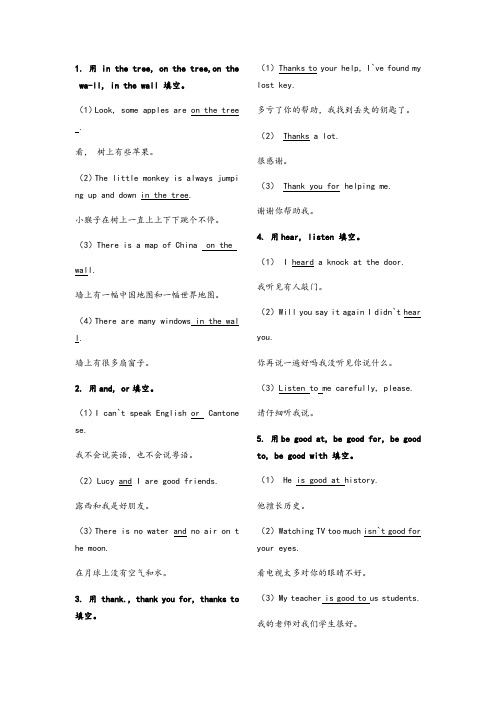
1. 用 in the tree, on the tree,on the wa-ll, in the wall 填空。
(1)Look, some apples are on the tree .看,树上有些苹果。
(2)The little monkey is always jumpi ng up and down in the tree.小猴子在树上一直上上下下跳个不停。
(3)There is a map of China on thewall.墙上有一幅中国地图和一幅世界地图。
(4)There are many windows in the wal l.墙上有很多扇窗子。
2. 用and, or填空。
(1)I can`t speak English or Cantone se.我不会说英语,也不会说粤语。
(2)Lucy and I are good friends.露西和我是好朋友。
(3)There is no water and no air on t he moon.在月球上没有空气和水。
3. 用 thank., thank you for, thanks to 填空。
(1)Thanks to your help, I`ve found my lost key.多亏了你的帮助,我找到丢失的钥匙了。
(2) Thanks a lot.很感谢。
(3) Thank you for helping me.谢谢你帮助我。
4. 用hear, listen 填空。
(1) I heard a knock at the door.我听见有人敲门。
(2)Will you say it again I didn`t hearyou.你再说一遍好吗我没听见你说什么。
(3)Listen to me carefully, please.请仔细听我说。
5. 用be good at, be good for, be good to, be good with 填空。
初中英语易混淆副词
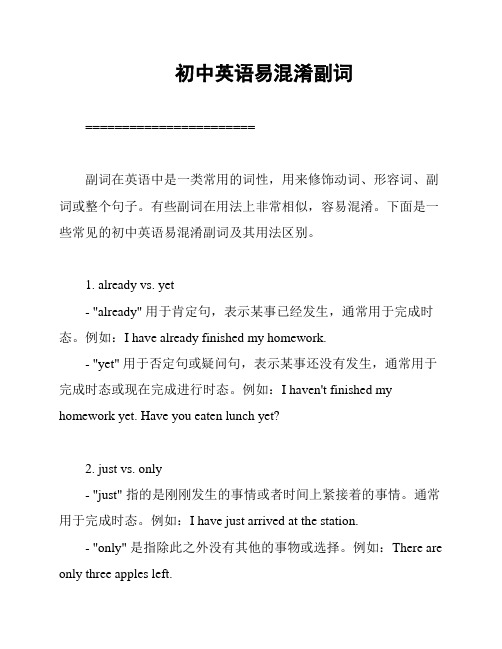
初中英语易混淆副词=======================副词在英语中是一类常用的词性,用来修饰动词、形容词、副词或整个句子。
有些副词在用法上非常相似,容易混淆。
下面是一些常见的初中英语易混淆副词及其用法区别。
1. already vs. yet- "already" 用于肯定句,表示某事已经发生,通常用于完成时态。
例如:I have already finished my homework.- "yet" 用于否定句或疑问句,表示某事还没有发生,通常用于完成时态或现在完成进行时态。
例如:I haven't finished my homework yet. Have you eaten lunch yet?2. just vs. only- "just" 指的是刚刚发生的事情或者时间上紧接着的事情。
通常用于完成时态。
例如:I have just arrived at the station.- "only" 是指除此之外没有其他的事物或选择。
例如:There are only three apples left.3. already vs. still- "already" 表示某事已经发生,并且常常用于否定句或疑问句。
例如:She has already left.- "still" 表示某事持续存在,常用于肯定句中。
例如:He is still studying for the exam.4. usually vs. often- "usually" 表示某事或情况在通常情况下发生,并不表示频率。
例如:I usually go to bed at 10 pm.- "often" 用于表示频率较高的情况。
例如:She often helps her classmates with their homework.5. enough vs. too- "enough" 表示满足要求或需要,强调达到某个水平。
初中英语中考常用介词短语和易混易错词组
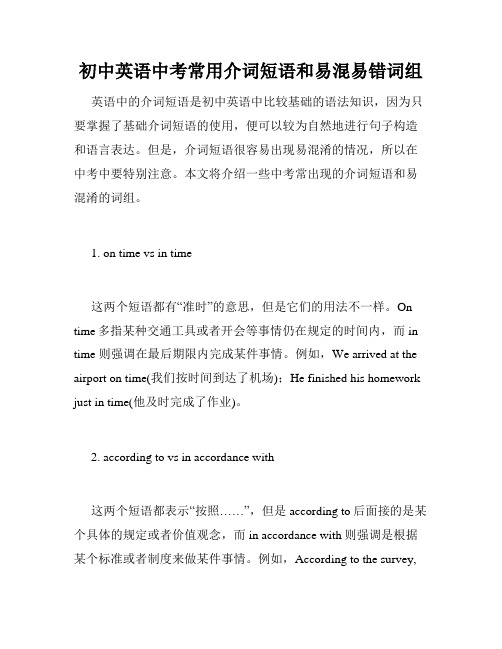
初中英语中考常用介词短语和易混易错词组英语中的介词短语是初中英语中比较基础的语法知识,因为只要掌握了基础介词短语的使用,便可以较为自然地进行句子构造和语言表达。
但是,介词短语很容易出现易混淆的情况,所以在中考中要特别注意。
本文将介绍一些中考常出现的介词短语和易混淆的词组。
1. on time vs in time这两个短语都有“准时”的意思,但是它们的用法不一样。
On time多指某种交通工具或者开会等事情仍在规定的时间内,而in time 则强调在最后期限内完成某件事情。
例如,We arrived at the airport on time(我们按时间到达了机场);He finished his homework just in time(他及时完成了作业)。
2. according to vs in accordance with这两个短语都表示“按照……”,但是according to后面接的是某个具体的规定或者价值观念,而in accordance with则强调是根据某个标准或者制度来做某件事情。
例如,According to the survey,more and more people prefer to work from home(根据调查,越来越多的人喜欢在家工作); In accordance with company regulations, smokers may only smoke in designated areas(根据公司规定,吸烟者只能在指定区域吸烟)。
3. in spite of vs despite这两个短语都表示“尽管”,但in spite of通常用来表示困难或者阻力,而despite则强调不受阻碍的情况。
例如,In spite of the heavy rain, we still went hiking(尽管下着大雨,我们还是去远足了);Despite the fact that he was tired, he continued to work(尽管很累,他还是继续工作)。
初中英语中常见的易混知识点

初中英语中常见的易混知识点易混知识点在初中英语学习中是常见的,因为它们经常会让学生感到困惑。
这些易混知识点涉及语法、词汇和说法等方面。
在本文中,我将列举一些常见的易混知识点并解释它们的区别,以帮助初中生更好地理解和应用它们。
一、a, an和thea和an都是不定冠词,表示单数不特指的人或物。
a用于以辅音音素开头的单词前,而an用于以元音音素开头的单词前。
例如,a book(一本书)和an apple (一个苹果)。
在此之后,我们使用定冠词the来指代特定的人或物。
例如,the book on the table(桌子上的那本书)。
二、there, their和they'rethere是副词,用于指示某处的位置。
例如,There is a cat in the garden(花园里有只猫)。
their是形容词,表示归属关系,意思是“他们的”。
例如,Their house is big(他们的房子很大)。
they're是they are的缩写形式,意思是“他们是”。
例如,They're my friends(他们是我的朋友)。
三、too, two和totoo是副词,意思是“也”,用于表示程度或数量过高。
例如,I am too tired to go (我太累了,无法去)。
two是数字2。
to是介词,用于表示方向、目的或比较。
例如,He went to the store(他去了商店)。
四、its和it'sits是形容词,表示归属关系,意思是“它的”。
例如,The cat licked its paws(猫舔了它的爪子)。
it's是it is的缩写形式,意思是“它是”。
例如,It's a beautiful day (今天是个美好的日子)。
五、your和you'reyour是形容词,表示归属关系,意思是“你的”。
例如,Is this your book?(这是你的书吗?)。
38个初中易混单词及短语的用法及区别
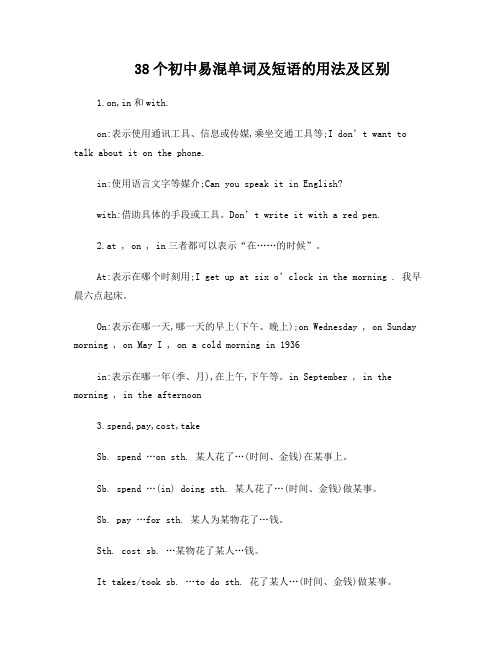
38个初中易混单词及短语的用法及区别1.on,in和with.on:表示使用通讯工具、信息或传媒,乘坐交通工具等;I don’t want to talk about it on the phone.in:使用语言文字等媒介;Can you speak it in English?with:借助具体的手段或工具。
Don’t write it with a red pen.2.at , on , in三者都可以表示“在……的时候”。
At:表示在哪个时刻用;I get up at six o’clock in the morning . 我早晨六点起床。
On:表示在哪一天,哪一天的早上(下午、晚上);on Wednesday , on Sunday morning , on May I , on a cold morning in 1936in:表示在哪一年(季、月),在上午,下午等。
in September , in the morning , in the afternoon3.spend,pay,cost,takeSb. spend …on sth. 某人花了…(时间、金钱)在某事上。
Sb. spend …(in) doing sth. 某人花了…(时间、金钱)做某事。
Sb. pay …for sth. 某人为某物花了…钱。
Sth. cost sb. …某物花了某人…钱。
It takes/took sb. …to do sth. 花了某人…(时间、金钱)做某事。
4.too much, too many, much tootoo much + 不可数名词too many + 可数名词much too + 形容词5.not …until &untilnot …until 直到…才…(主句动词是短暂性动词)until 一直到…(主句中使用延续性动词)6.few, a few; little , a little. 虽然都表示“少”,但(1)few, a few是可数的, little, a little是不可数的。
初中英语易错易混辨析归纳

易错易混辨析1. a bit 与a little①在肯定句中,a bit=a little,意为“有点儿”,修饰形容词或副词。
另外,a little还可以修饰不可数名词,意为“一点儿”。
Your article is a bit/a little long.There is only a little food left.②在否定句中,not a bit=not at all,意为“毫不”;not a little =very,意为“非常”。
The old man says that he is not a bit tired but in fact he is not a little tired.2.about与on都表示“关于”①about表示的内容较为普通,不是特别正式。
A book about Lei Feng②on表示严肃的或学术的A book on African history.3.above,on与over在......之上①表示位置高于某物(反below)Our office is above the shop.②表示物体表面相接触(反beneath)There is a glass on the desk.③表示垂直的上方(反under)There is a lamp hanging over the desk.4.accept与receive①表示主观上接受②表示客观上收到The girl received a gift,but she didn’t accept it.例题.I didn’t mean to trouble Curry yesterday. It was pouring with rain so I his offer of a lift. A.refused B.received C.allowed D.accepted5.across,throug与over①across在某个平面穿过②through从立体空间里穿过③over从上方越过The Great Wall winds its way from west to east ,across the deserts,over the mountains,through the valleys,till at last it reaches the sea.例题.You must be careful when you swim the lake.A.acrossB. belowC.overD.through6.ago与before①ago表示从事情发生到现在过去了多久(和一般过去时连用)②before表示从事情发生到过去某个时间是多久(可以和过去时或完成时连用)A week ago I went to see him ,but his father said that he had left two weeks before.7.agree with ,agree to 与agree on①agree with指“同意某人或某人的意见、观点、决定、想法、安排、解释”等,其后可以是一个名词或人称代词,也可以是what引导的从句。
初中英语易混词辨析

初中英语易混词辨析enjoy,like,love,preferenjoy,like,love和prefer都可表达“喜爱”的意思,但含义和用法有所不同。
enjoy在意义上侧重于“享受某种乐趣”,后接名词或动名词作宾语,不能接不定式。
enjoy还可以与反身代词连用,即“enjoy oneself”,表示“玩得很高兴”(= have a good time)The man is enjoying his dinner. 那个男人正津津有味地吃饭。
My father enjoys listening to the radio. 我父亲爱听广播。
Did the children enjoy themselves in the park? 孩子们在公园里玩得愉快吗?like意为“喜欢、喜爱”,是一般用语,主要是指对某人或某物产生好感或发生兴趣,不带有感情色彩,后面可接名词、代词、动名词、动词不定式作宾语。
Everyone in China likes Mid-Autumn Day. 在中国,每个人都喜欢中秋节。
He likes his students to work hard. 他喜欢他的学生努力学习。
love表示“爱、热爱、爱戴”,有强烈的感情,相当于like…very much,侧重于对祖国及较亲近的人的深厚感情。
在口语中它往往又指一般的喜爱,这时与like的意思相近,可以互换。
后面也可以接名词、动名词或动词不定式。
We love our motherland. 我们热爱我们的祖国。
They love playing/to play basketball. 他们爱打篮球。
like和love都可与would,should连用,表示“愿意做某事”。
I’d like/love to go with you. 我愿意和你们一起去。
prefer意为“(比较)喜欢、宁愿”,相当于like…better,它的“喜欢”是带有选择性的,是在比较的情况下选择出来的,其后接名词、代词、动名词或不定式。
初中英语常见常考易混短语例解
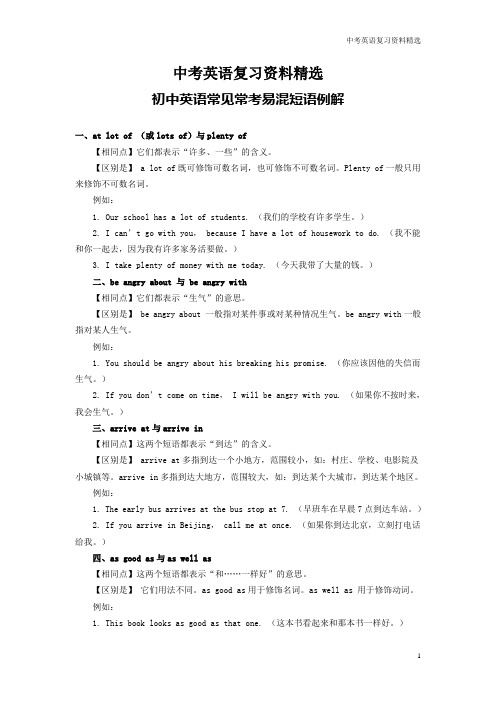
中考英语复习资料精选初中英语常见常考易混短语例解一、at lot of (或lots of)与plenty of【相同点】它们都表示“许多、一些”的含义。
【区别是】 a lot of既可修饰可数名词,也可修饰不可数名词。
Plenty of一般只用来修饰不可数名词。
例如:1. Our school has a lot of students. (我们的学校有许多学生。
)2. I can’t go with you, because I have a lot of housework to do. (我不能和你一起去,因为我有许多家务活要做。
)3. I take plenty of money with me today. (今天我带了大量的钱。
)二、be angry about 与 be angry with【相同点】它们都表示“生气”的意思。
【区别是】 be angry about 一般指对某件事或对某种情况生气。
be angry with一般指对某人生气。
例如:1. You should be angry about his breaking his promise. (你应该因他的失信而生气。
)2. If you don’t come on time, I will be angry with you. (如果你不按时来,我会生气。
)三、arrive at与arrive in【相同点】这两个短语都表示“到达”的含义。
【区别是】 arrive at多指到达一个小地方,范围较小,如:村庄、学校、电影院及小城镇等。
arrive in多指到达大地方,范围较大,如:到达某个大城市,到达某个地区。
例如:1. The early bus arrives at the bus stop at 7. (早班车在早晨7点到达车站。
)2. If you arrive in Beijing, call me at once. (如果你到达北京,立刻打电话给我。
- 1、下载文档前请自行甄别文档内容的完整性,平台不提供额外的编辑、内容补充、找答案等附加服务。
- 2、"仅部分预览"的文档,不可在线预览部分如存在完整性等问题,可反馈申请退款(可完整预览的文档不适用该条件!)。
- 3、如文档侵犯您的权益,请联系客服反馈,我们会尽快为您处理(人工客服工作时间:9:00-18:30)。
初中英语常见常考易混词用法辨析七年级1 besides ,except, except for,but(1)besides包括后面所提及的人或物在内,“除、、、之外还(又)”。
Twenty-five students went to the cinema besides him。
(2)except不包括后面所提及的人或物在内,“抛开、、、不谈".Twenty—five students went to the cinema except him。
(3)except for不包括后面所提及的人或物在内的“除了”,后面跟的词与句子的主语不属于同类.Your article is very good except for some mistakes。
(4)but常与every,any,all,none,no以及它们与thing ,body,where构成的复合词等连用。
有的已经成为了惯用语,如:all but“几乎,除、、、之外全部”,anything but “除、、、之外都”,nothing but“只不过是、、、"。
There is nothing but a cup on the table.练习:1)All the questions are easy _________the last one.2)Do you think of nothing_____________watching football?3)His composition is good __________for some mistakes。
4)He has many relatives_____________his uncle living in Shanghai.5)Do you know any other language__________English?2 reach , arrive in/at ,get to(1)reach +地点,“到达"。
(2)arrive in+大地方,arrive at+小地方,“抵达、达到某地(尤指行程的终点)"。
(3)get to+地点,“到达"。
(4)当arrive in/at和get to后面跟的是地点副词here,there,home等,则省略介词in/at/to。
(5)当只表明“到了”,而未表明地点时用arrive。
练习:1)My sister________school at 7a.m every day.2)Uncle Li __________New York the day before yesterday。
3)You can___________the railway station by bus。
4)My father_________at 8:00 this morning by airplane.5)How did you______________home yesterday afternoon?6)Do you how to___________there ?7)I will tel you how to ____________here,so d not worry。
3 at the end of , in the end , by the end of(1)at the end of 指某段时间的结束或某段路程的终止处,“在、、、结束时”,“在、、、尽头”。
Our school held a sports meeting at the end of last term。
At the end of this street you will find a bookshop.(2)in the end 相当于at last ,finally,“最后,终于".In the end they caught the thief。
(3)by the end of 用于过去完成时或将来时,“到、、、末为止”。
By the end of last term we have learned five English songs.This question will have been answered by the end of today.练习:1)We will have an English exam _________________January.2)I am sure everything will turn out satisfactory_______________.3)________________the meeting,everyone stood up to give the applause.4)______________last month, I had planted thousands f trees。
4 it , one, that(1)it 代替上文所提到的那个事物,一般指物,不指人.可以代替单数可数名词或不可数名词。
复数形式是they或them。
I have 50 yuan. My uncle gave it to me last week.(2)one 代替上文出现过的单数名词,以免重复。
泛指代人或物.所指代的人或物属于同类事物中不同的一个,即替代的是一个带有不定冠词的可数名词的单数形式。
复数形式是ones.I have lost my old watch。
This is a new one。
(3)that 代替前面同类不同一的事物。
可以代替单数可数名词或不可数名词.代替可数名词时,复数形式是those。
that不可以替代表示人的名词,它可以根据语义在后面加上一些定语,多数是of的短语;他的前面不能存在任何定语。
The water in wells is cleaner than that in the rivers。
练习:1)Do you need an English—Chinese dictionary ? I have__________。
2)The language used in advertisements differs from __________ used in ordinary readings.3)The color of the jacket is better than__________of mine。
4)I saw only one motorcar in the shop。
Would you go and buy__________?5)Maybe it is true that we do not know what we have got until we lose _________.5 look for, look up , find , find out(1)look for“寻找”,强调找的过程.(2)Look up “查找",强调查字典、电话号码.(3)Find“找到,发现”,强调找的结果。
(4)Find out“查明,发现,了解”,指的是经过认真观察、调查或研究把某事或某物查出来、搞清楚,多用于复杂而不容易直接查出的情况。
练习:1)I’m__________my watch,but I can’t________it。
2)If you do not know the words , you can__________them _________in the dictionary.3)I__________it difficult to learn English well。
4)The teacher wanted to __________who had broken the door.6 as well,as well as(1)as well 相当于also,too“也,又”.常放在句子末尾,无需用逗号与句子分开。
I am going to London and my sister is going as well.(2)as well as “也,还”.常用来连接两个并列的成分。
连接连个并列的主语时,谓语动词与前面的主语保持一致;翻译时先翻译后面,在翻译前面。
Your wife as well as you is friendly to me。
练习:1)The teachers _____________the students are working overtime。
2)They played all kinds of instruments and sang___________.7 rather than , instead of ,in place of(1)rather than和would连用时构成would rather。
than...“宁愿、、、而不愿、、、”的句式,表示主观愿望,在两者中择一。
She would rather die than lose her children。
rather than不和would连用时,表示客观事实,“是、、、而不是、、、;与其、、、不如、、、”。
它的并列成分可以是名词,代词,形容词,介词(短语),动名词,分句,不定式,动词等等。
Rather than连接两个主语时,谓语动词应该和前面的主语保持一致.Rather than连接两个不定式时,不定式可以带to,也可以不带to.He is an explorer rather than a sailor。
You rather than I are going to go camping.I decided to write rather than (to)telephone.(2)instead of “代替”,“做、、、而不做、、、”.My parents just called me.I’m afraid I have to have dinner with them instead of shopping with you tonight。
(3)in place of “代替".着重强调一种物质替换另一种物质。
Plastics are now often used in place of wood or metal.练习:1)He ran ___________walked。
2)_______________making progress,my work actually seems to be going backwards.3)William talked at the meeting ____________the manager who was sick。
